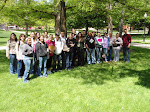The question of what is poetry may lead to
Who is to say or judge to
Is it really either?
Opinions, answers of right answers vs. wrong answers
And wrong answers vs. right answers
May cause anxiety and perspiration to the person who is put on the spot.
But to be able to form one's own view and create an image so delicate
Or fierce in the mind is an amazing gift that can be rewrapped time and time
Again.
In 1917, Viktor Shklovsky proposed "Art as Technique"
and "Art as Device"
How beautiful a proposition to rehash the works of poetry and
"make the stone, stony again."
I have heard that poetry is a way to find yourself and that
there is no right or wrong answer in poetry
So I ask
What makes poetry so intimidating?
Could it be the structure of some poetry?
The wordiness writers use creating their main point?
Or the useless way I was taught in the glory days of High school
When it was said that limericks are a friend.
Some say these poems have received bad press
Some say they have been dismissed as not having a rightful place of
"cultivated poetry"
The three-fold of a limerick is that they are often of humorous nature
They only have five lines so are simple and short and
Have contributed to the critics attitudes.
To judge the limerick, the brother poem of Whitman's "Preface"
Disregards the wish of positivity, faith, and generosity
Can we not help the limerick like Whitman lectures of the importance
of all people in "I Sing the Body Electric"?
Amor Fati; Love and Fate.
Described as an attitude in which one sees everything that happens in
One's life
Including suffering and death as
Good.
The ultimate purpose is
Destiny.
The sign of a good person is
One who can love and be kind in the face of
Ugliness.
Whitman describes in the "Preface" that
A poet is transcendent and new
A poet is indirect and not direct
A poet is descriptive or epic
A poet can make every word he speaks draw blood
A poet is no arguer but he
is judgment.
A poet has the power to destroy
A poet can remould freely but never for the power of
attack.
A poet hardly knows pettiness or triviality
A poet consumes an eternal passion and is indifferent which
chance happens and which possible contingency of fortune
or misfortune and persuades daily and hourly his delicious pay
A poet brings the spirit of any or
all events and passions and scenes and persons some more and
some less to bear on an individual character as heard and read
A poet forms the consistence of what is to be from
what has been and is
A poet does not moralize or make applications of morals
A poet knows the soul.
I look at poetry as inspiration and medicine to the heart and soul
"Be indifferent to the things that befall you, not to others, love whatever
happens to you. Do not let what befalls you get you down."
A life lesson is a lesson learned
As produced by Emerson- "Our energy increases with affection.
By increasing our ability to be kind, warm-hearted, and generous;
We become smarter."
Poetry works as medicine in the way it can take the unmetabolized pain that sits within the self,
leaking out in all the wrong places and expose them in writing
Lack thereof poetry may result in loss of contact with the soul
teamed with real, true, authentic emotions
Poetry provides intimacy, a series of beautiful opinions with no reason
for a concrete answer
It can help those reveal the beauty of dirt
the pain of a flower and
comedy of a grave
A game of connect the dots where each connection made provides a picture
A math problem where the result will never receive a red check
An application that will not be denied
The beauty of a poem is what the reader makes out of it
That reader from
This reader to
The reader over there
Will each comprise an individual idea and create a
Bond that they can call their own.
LINDSEY BABCOCK
Tuesday, May 19, 2009
Subscribe to:
Post Comments (Atom)

No comments:
Post a Comment